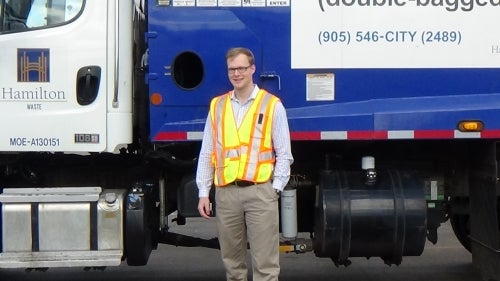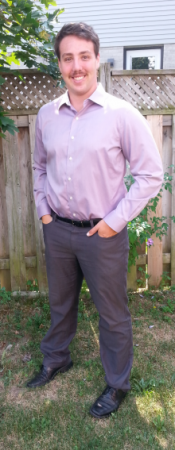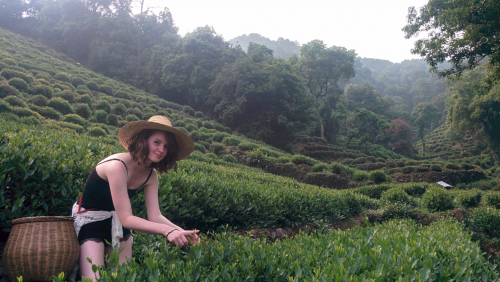The Daily Bulletin is published by Internal and Leadership Communications, part of University Communications
Contact us at bulletin@uwaterloo.ca
Submission guidelines
Editor:
Brandon Sweet
Marketing & Strategic Communications
bulletin@uwaterloo.ca
The University of Waterloo rose 17 places to be ranked 152nd in the world in 2015, according to Quacquarelli Symonds (QS), a UK firm that released an annual ranking of world universities on Tuesday.
Almost all Canadian U15 universities experienced a decline in their results over last year. All institutions declined except Waterloo and McGill, which moved ahead of Toronto to the top spot in Canada.
QS made significant changes to the methodology used to calculate their ranking this year. The changes are designed to normalize the number of citations in academic publications between research disciplines with the aim of providing a fairer comparison of universities’ research impact.
Specifically, they introduced a faculty-level normalization for the Citation per Faculty indicator. The effect of this change resulted in each faculty area (Arts & Humanities, Engineering & Technology, Life Sciences & Medicine, Natural Sciences, and Social Sciences & Management) contributing more equally to the citations per faculty indicator.
Institutions with medical schools have traditionally had an advantage in this indicator due to the large volume of publications and citations in the Life Sciences & Medicine area; the change QS introduced this year largely neutralizes this advantage. They also introduced adjustments at the country level which attempt to control for English-language bias in publications, and to avoid penalizing specialist institutions.
“I am encouraged that this ranking recognizes the world class research, scholarship and innovation that takes place at the University of Waterloo,” said Feridun Hamdullahpur. “I applaud QS for their efforts to better represent the work of research intensive universities, in particular unconventional innovation centres like ours that do not have a medical school.”
Waterloo is among just eight Canadian universities ranked in the top 200 in the world and is listed seventh of the Canadian schools. In April, QS ranked three subjects at Waterloo in the top 50 in the world and eight other subjects among the top 100 – an increase of subjects in the top 100 from seven to 11.
In 2014, Waterloo became one of only 11 universities in the world to earn a 5+ star rating in the QS Stars rating, which evaluates universities against over 50 different factors. QS introduced the star rating system to help future students make decisions about which school to attend, looking at criteria such as the employability of graduates, teaching, sports facilities, and many others.
Quacquarelli Symonds (QS) World University Rankings ranks approximately 700 universities overall and in five faculty areas: Engineering and Technology, Life Sciences and Medicine, Natural Sciences, Social Sciences, and Arts and Humanities.
Earlier this year, QS ranked Waterloo 20th in the world for its work in Mathematics, 24th for Computer Science and 48th in the world for Geography.
The sold-out, two-day Waterloo Innovation Summit kicks off today as top business, academic and policy decision-makers will gather in Kitchener and Waterloo to get a taste of what’s in the water in one of the world’s leading innovation ecosystems.
More than a dozen international speakers, including Silicon Valley sage and entrepreneur Steve Blank, economist Mariana Mazzucato (author of the Entrepreneurial State), strategist and entrepreneur Salim Ismail, venture capitalist Ajay Royan and John Chen, CEO of BlackBerry, will join tech leaders, academics, scientists and policy makers for in-depth conversations on how to win in the global innovation economy.
Attendees will hear from influences, share best practices with enablers, and experience first-hand what it takes to lift a region into global contention.
Communitech and the University of Waterloo are teaming up to present a lively, frank and informed discussion that will explore factors that drive the world’s best innovation regions, from universities and governments making big bets on science, to the shifting roles of the public and private sectors, to what entrepreneurs really need – and don’t need – to succeed.
The lineup of keynotes, firesides chats, and panel sessions will take place over two days at the main summit locations:
The event begins with a tour of Waterloo region's innovation ecosystem at 11:00 a.m. today, with stops that include the University of Waterloo campus and the Faculty of Engineering, Wilfrid Laurier University, the David Johnston Research + Technology Park, the Accelerator Centre, OpenText, the Communitech Hub, Velocity Garage, Desire2Learn, Google, and the Perimeter Institute for Theoretical Physics.
At 4:30 p.m., the Accelerator Centre is hosting a Client Showcase that will shine a spotlight on the most innovative ideas, products, and solutions in Waterloo Region, allowing attendees to interact directly with the entrepreneurs currently working towards commercialization at the Accelerator Centre.
A welcome reception for conference attendees will be held at 6:00 p.m. at the Centre for International Governance Innovation in UpTown Waterloo.
Shuttles will be available for attendees for travel to various locations for receptions, an Interactive Playground, and a Quantum Symphony performance.
All events take place in Kitchener or Waterloo at the University of Waterloo, Communitech, the Centre for International Governance Innovation and the Conrad Centre for the Performing Arts.
Follow along with the hashtag #WINS2015.
by Yuni Jo.

The University of Waterloo’s co-operative education program is highly recognized for providing students with the opportunity to apply their academic knowledge in the workplace and helping students identify their ideal future career path. For 4A Honours Kinesiology students Daniel Armstrong and Thomas Allin, working for the City of Hamilton has allowed them to develop beneficial professional skills that are applicable in the real world.
During their work term with the Hamilton Paramedic Service, Daniel’s main responsibilities were developing and executing programs to reduce EMS injuries for paramedics, while Thomas participated in ergonomic interventions.
 “I believe that the most important lesson to get out of a work term is learning how to apply academic knowledge in an occupational setting,” says Daniel. “Academically, you learn the theory behind why an intervention can be beneficial, but occupationally you must consider other factors such as cost and feasibility.”
“I believe that the most important lesson to get out of a work term is learning how to apply academic knowledge in an occupational setting,” says Daniel. “Academically, you learn the theory behind why an intervention can be beneficial, but occupationally you must consider other factors such as cost and feasibility.”
Healthy Workplace Specialist Miri Freimanis, who supervised both Daniel and Thomas, was very pleased with their accomplishments. “Dan and Thomas exceeded everyone’s expectations for student placements during their co-op terms with us. Our Health, Safety & Wellness team, other department stakeholders and many employees reported that their professionalism, attitude, skills and outside-the-box thinking, were outstanding,” says Miri, who also happens to be a Waterloo Kinesiology alumnus.
“Working with the City of Hamilton has been a fantastic co-op experience. It has helped me to establish my future career path, make connections, and has allowed me to draw on the knowledge of experienced staff members,” says Thomas.
Both plan on pursuing master degrees after graduation to enhance their insight that would help lead to a career in ergonomics for Daniel and physiotherapy for Thomas.
As for advice for students looking for their first work term position? Thomas says, “Get involved early with relevant volunteer or work experience to set yourself apart. There are a ton of opportunities on campus or working with faculty members.”
This article was originally published on the Renison University website.

When Isabella Marchand signed up for the Study in China program through Renison University College, she didn’t speak a word of Mandarin. She knew that communication would be a challenge as she made her way through Nanjing, Bejing, and Shanghai over a six-week period. But with an intensive language course set up through a partnership between Renison, the Confucius Institute, and Nanjing University, she was able to read about 500 Chinese characters and speak conversationally by the end of her trip.
“I loved doing little things like directing cabs, ordering food, asking if stores had certain products, and enjoying a bit of small talk with locals. Being back home now, I've even had someone doubt that I'd only spent a month and a half studying Mandarin,” says Marchand.
This program is one of many language-learning opportunities at Renison, an affiliate of the University of Waterloo. Open to any member of the community, Renison offers Community and Professional Education (CAPE) classes in Arabic, Chinese (Mandarin), Japanese, Korean, and Turkish. There are also courses for multilingual speakers looking to improve their English through Renison’s English Language Centre (ELC).
Tanya Missere Mihas, Director of the ELC and the Associate Director of International and Intercultural Development at Renison, says that these courses are an excellent form of professional development or continuing education for members of the community or university students looking to learn a new language without affecting their GPA.
“Studying languages and learning about different cultures can help inspire students to engage in a study or work term abroad,” says Missere Mihas. “Working and studying in other countries is becoming more common. Being introduced to this as a university student is a great way to embark on global citizenship. Our community courses can give students a head start on such experiences as they provide small class sizes and a relaxed environment, both being ideal for language acquisition.”
While the Study in China program allowed students to learn Mandarin in a native speaking country, the on-campus classes engage students through immersive and intimate classrooms (usually between five to fifteen students). Classes are taught by native speakers of Arabic, Chinese, Japanese, Korean, Turkish, and English. Each course consists of a weekly two-hour class over the duration of ten weeks, usually happening on a weekday evening between 7:00-9:00 pm.
Fall 2015 courses start the week of September 21; this term, Renison is offering 14 different language classes. Each course costs $250 (with a one-time application fee of $30 if you are a first time registrant) and the deadline to sign up is September 18, 2015. Students can register and pay online.
We also offer credit courses for UWaterloo students in Arabic, English for Mulitilinguage Speakers, Chinese, Japanese, and Korean.
95 years ago: Terrorists bomb Wall Street
Feds Welcome Week, Monday, September 14 to Friday, September 18.
Waterloo Innovation Summit, Wednesday, September 16 to Friday, September 18.
UWRC Book Club featuring Station Eleven by Emily St. John Mandel (One Book One Community Selection), Wednesday, September 16, 12:00 p.m., LIB 407.
Noon Hour Concert: Earth Voices, Wednesday, September 16, 12:30 p.m., Conrad Grebel University College Chapel.
Writing Centre Open House, Wednesday, September 16, 1:00 pm to 4:00 p.m., South Campus Hall second floor.
Chemistry Department Seminar Series feat. Professor Theocharis Stamatatos, Department of Chemistry, Brock University, “Polynuclear Metal Complexes as High-Spin Molecules and Single-Molecule Magnets: A ‘Bottom-up’ Approach to Nanoscale Magnetism”, Wednesday, September 16, 2:30 p.m., C2-361.
Gustav Bakos Observatory Tour, Wednesday, September 16, 9:00 p.m., PHY 308.
Translating Academic Experience to Industry, Thursday, September 17, 1:30 p.m. to 3:30 p.m., TC 1208.
UW Farm Market, Thursday, September 17, 9:00 a.m. to 1:00 p.m., SLC lower atrium.
Mathematics graduate studies information night, Thursday, September 17, 4:30 p.m., MC 5501.
Graduate Scholarship Information Session, Thursday, September 17, 5:00 p.m., Humanities Theatre. (Note: attendees only need to attend one of the two sessions).
Medical School Applications (OMSAS), Thursday, September 17, 5:30 p.m. to 8:00 p.m., TC 1208.
Take Back the Night 2015, Thursday, September 17, 6:00 p.m., Kitchener City Hall.
Résumés for Graduate Students, Friday, September 18, 2:30 p.m. to 4:00 p.m., TC 1208.
Hack The North, Friday, September 18 to Sunday, September 20.
Doors Open Waterloo Region, Saturday, September 19, HockeyTech demonstration at the Columbia Icefield Arena, 2:00 p.m. and 4:00 p.m.
Quiet Research, Loud Results! Saturday, September 19, 10:00 a.m., TechTown building.
Conrad Grebel presents Peace Week, Monday, September 21 to Saturday, September 26.
It’s All About Your Skills, Monday, September 21, 10:30 a.m. to 12:30 p.m., TC 1112.
Senate meeting, Monday, September 21, 3:30 p.m., Needles Hall.
Velocity Science: Brainstorming, Tuesday, September 22, 7:30 p.m., QNC room 1506.
Biological Conservation Research Opportunities for Students, OpWall Info Session, Wednesday, September 23, 12:30 p.m., Needles Hall, 3001.
UW Retirees’ Association Annual Fall Reception, Wednesday, September 23, 3:00 p.m., University Club.
UW Farm Market, Thursday, September 24, 9:00 a.m. to 1:00 p.m., SLC lower atrium.
Tomson Highway presents A Tale of Monstrous Extravagance, Thursday, September 24, 2:00 p.m., Theatre of the Arts.
WPIRG presents September Slam: Humble the Poet & KWPS, Thursday, September 24, 7:00 p.m., Humanities Theatre.
The Birth of Homeopathy out of the Spirit of 1800: Medicine as Cultural History, Friday, September 25, 7:00 p.m., Location TBA. Presented by the Waterloo Centre for German Studies.
Ontario Universities' Fair, Friday, September 25 to Sunday, September 27, Metro Toronto Convention Centre.
Hack4Health, Saturday, September 26 to Sunday, September 27, Waterloo Accelerator Centre.
Annual Traditional Pow Wow, Saturday, September 26, 12:00 p.m., Waterloo Aboriginal Education Centre, St. Paul's University College.
The Ceremony of Induction into Professional Planning Education, Saturday, September 26, reception and registration in Environment 3 Atrium, 9:30 a.m., ceremony in Theatre of Arts, 11:00 a.m.
CBB Seminar - Cynthia Goh, Director, Impact Centre; professor, scientist and serial entrepreneur, Wednesday, September 30, 2:00 p.m., E6 4022.
Office of Research United Way Bake Sale, Thursday, October 1, 8:30 a.m. to 2:30 p.m., NH 1043.
UW Farm Market, Thursday, October 1, 9:00 a.m. to 1:00 p.m., SLC lower atrium.
University of Waterloo Research Talks featuring Professor Heather Keller, "Finding solutions to nutritional vulnerability in older adults," Friday, October 2, 12:00 p.m., DC 1302. Register online, seating is limited.
English Faculty Research Series: Mediated Bodies, Friday, October 2, 1:30 p.m., HH 373.
40th Anniversary Mathematics Reunion - Class of 1975, Friday, October 2 to Saturday, October 3.
Reunion 2015, Saturday, October 3.
AHS Annual Fun Run, Saturday, October 3, 8:30 a.m., BC Matthews Hall.
Further Education Boot Camp, Saturday, October 3, all day, RCH.
Fall Teaching Week, Monday, October 5 to Friday, October 9.
UW Farm Market, Wednesday, October 7, 9:00 a.m. to 1:00 p.m., SLC lower atrium.
On this week's list from the human resources department, viewable through myHRinfo:
Internal secondment opportunities, viewable on myCareer@uWaterloo:
The Daily Bulletin is published by Internal and Leadership Communications, part of University Communications
Contact us at bulletin@uwaterloo.ca
Submission guidelines
The University of Waterloo acknowledges that much of our work takes place on the traditional territory of the Neutral, Anishinaabeg, and Haudenosaunee peoples. Our main campus is situated on the Haldimand Tract, the land granted to the Six Nations that includes six miles on each side of the Grand River. Our active work toward reconciliation takes place across our campuses through research, learning, teaching, and community building, and is co-ordinated within the Office of Indigenous Relations.